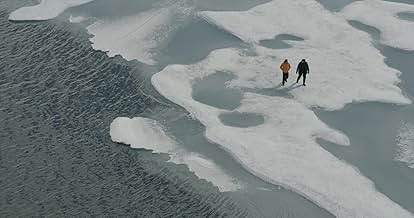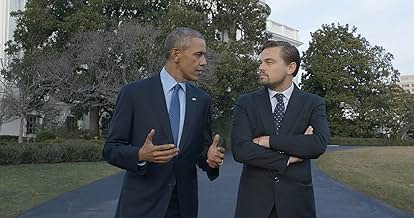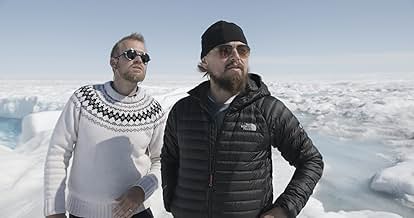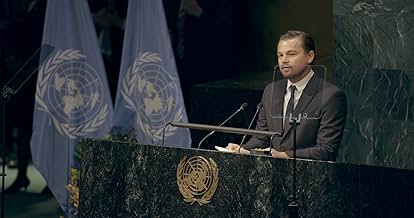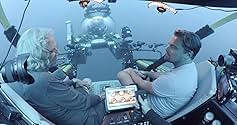A look at how climate change affects our environment and what society can do to prevent the demise of endangered species, ecosystems and native communities across the planet.A look at how climate change affects our environment and what society can do to prevent the demise of endangered species, ecosystems and native communities across the planet.A look at how climate change affects our environment and what society can do to prevent the demise of endangered species, ecosystems and native communities across the planet.
- Awards
- 2 wins & 8 nominations total
Ban Ki-moon
- Self
- (as Ban Ki-Moon)
Mike Brune
- Self
- (as Michael Brune)
Enric Sala
- Self
- (as Dr. Enric Sala)
Michael E. Mann
- Self
- (as Dr. Michael E. Mann)
Tommy Remengesau
- Self
- (as H.E. Tommy E. Remengesau Jr.)
- Director
- Writer
- All cast & crew
- Production, box office & more at IMDbPro
Featured reviews
Being the objective of this documentary to raise awareness and support DiCaprio's activity as a "UN messenger of peace" and environmental activist, I believe it really achieved its goal as it is truly a breathtaking, eye-opening film which urges the viewer to strive for a change.
Throughout the documentary we are presented with shocking information, images and educated people's opinion on the matter (like world leaders and scientists) which adds credibility to it. Leonardo DiCaprio and his team do not spare criticism on some of the biggest countries (like the US) policies and on the fossil fuel industry.
Leo's charisma and ability to persuade and entertain the public allied to his drive as an environmental activist just leaves you glued to your seat thinking what can you do to make a change. I believe this really is the kind of information that should be more out there and DiCaprio's celebrity-status, as well as all the other people interviewed, is great for visibility.
If anything, I just wish this was a mini-series to know even more about this issue the world is facing, which might just be the biggest one it ever did...
Throughout the documentary we are presented with shocking information, images and educated people's opinion on the matter (like world leaders and scientists) which adds credibility to it. Leonardo DiCaprio and his team do not spare criticism on some of the biggest countries (like the US) policies and on the fossil fuel industry.
Leo's charisma and ability to persuade and entertain the public allied to his drive as an environmental activist just leaves you glued to your seat thinking what can you do to make a change. I believe this really is the kind of information that should be more out there and DiCaprio's celebrity-status, as well as all the other people interviewed, is great for visibility.
If anything, I just wish this was a mini-series to know even more about this issue the world is facing, which might just be the biggest one it ever did...
Forget egos, forget who's who. That's not what this is about.
The message of this documentary film is to save our planet. Each country, each continent. Our home.
You are taken on a worldwide tour of diverse ecological systems. You are shown how people are already struggling due to the destruction and greed of man. You will see how our consumerism contributes to this disaster in the waiting.
Watch the evidence and see the consequences of global warming for yourself. This is powerful and sobering viewing. It has made me realize how I personally can take positive action to help prevent the destruction of our planet.
Collectively, we can make a difference. Wherever you live in the world, you can decide to have a role to play. Our elected leaders will act if enough of the people they govern make this issue a top priority.
Give one hour and a half of your time, then make your own mind up.
The message of this documentary film is to save our planet. Each country, each continent. Our home.
You are taken on a worldwide tour of diverse ecological systems. You are shown how people are already struggling due to the destruction and greed of man. You will see how our consumerism contributes to this disaster in the waiting.
Watch the evidence and see the consequences of global warming for yourself. This is powerful and sobering viewing. It has made me realize how I personally can take positive action to help prevent the destruction of our planet.
Collectively, we can make a difference. Wherever you live in the world, you can decide to have a role to play. Our elected leaders will act if enough of the people they govern make this issue a top priority.
Give one hour and a half of your time, then make your own mind up.
In the end, it's not about who pollutes more or less, we all have to make a personal change of lifestyle and mindset. I know i'm no where close to an ideal amount of consumption, but I want to try just a little harder to be more mindful of what I put into the environment and become a better steward of our beautiful planet and people. Great film. Very serious tones and messages throughout, but anything short of serious wouldn't make any real change, in my opinion. Being able to see some of the various examples of how fossil fuel, coal, and energy consumption negatively effects the environment reinforced the core messages very well. There was quite a lot of focus on DiCaprio in both face time with the cameras and the spotlight of the work that he has been doing in this field, but it is overshadowed by the bigger picture, which is addressing the problem that climate change poses on humanity and actually taking action.
Greetings again from the darkness. Ten years ago Al Gore became a climate-change icon thanks to the Oscar-winning documentary An Convenient Truth (from director Davis Guggenheim). With this updated warning, the climate change crown is passed to Leonardo DiCaprio, and rather than just speak to the topic, he takes us on a worldwide journey to show us the effects.
The film is bookended by DiCaprio's speech to the UN general assembly after he was named UN Messenger of Peace on Climate Change. It's a reminder that the mega movie star has long been an environmental activist and yes, before you scoff, he does acknowledge that his carbon footprint is probably larger than ours (an obvious understatement – unless you also travel by yacht and private jets, and own multiple mansions).
DiCaprio's personal story about Bosch's "The Garden of Earthly Delights" hanging above his crib (seriously, how many parents think this is acceptable artwork for a toddler?) acts as a visual to his message that we are on the path of virtual destruction to the earth that we now know.
The power of celebrity in on full display as DiCaprio scores interviews with such luminaries as UN Secretary General Ban Ki-moon, President Obama, Elon Musk, John Kerry, and even Pope Francis. There is also a clip of his long-ago interview with then President Clinton (Bill, not Hillary). However, it's not the talking heads that have the most impact here. Rather, it's the first-hand look at the Canadian Arctic, the disappearing glaciers of Greenland, the sunny day street flooding in Miami, the destruction of Indonesian Rain Forest to capitalize on the palm oil market, and the eroding coral reefs. The film plays like a Tim Burton Travel Channel series each stop more nightmarish than the previous.
His passion is obvious, though his knowledge less so. DiCaprio understands the power his celebrity brings, and he joins with director Fisher Stevens (known mostly for his acting, but also an Oscar winning director for The Cove, 2009) in this attempt to bring the urgent message to the masses. As they state, we are beyond simply changing lightbulbs, and the key is a shift from fossil fuels to renewable energy a shift that China (not the U.S.) has taken seriously.
With generic solutions like "consume less" and "vote better", the film mostly avoids controversy though it does acknowledge the slick and well-funded 'campaign of denial' by those who profit mightily from a fossil-fuel dependent world. We see an impressive map/video screen tracking ocean currents, temperatures, etc. and there is a chart comparing electricity usage by U.S. citizens vs other countries (we are energy hogs, in case you weren't sure). The ending message hasn't changed much in the past 10 years "It is all up to us".
The film is bookended by DiCaprio's speech to the UN general assembly after he was named UN Messenger of Peace on Climate Change. It's a reminder that the mega movie star has long been an environmental activist and yes, before you scoff, he does acknowledge that his carbon footprint is probably larger than ours (an obvious understatement – unless you also travel by yacht and private jets, and own multiple mansions).
DiCaprio's personal story about Bosch's "The Garden of Earthly Delights" hanging above his crib (seriously, how many parents think this is acceptable artwork for a toddler?) acts as a visual to his message that we are on the path of virtual destruction to the earth that we now know.
The power of celebrity in on full display as DiCaprio scores interviews with such luminaries as UN Secretary General Ban Ki-moon, President Obama, Elon Musk, John Kerry, and even Pope Francis. There is also a clip of his long-ago interview with then President Clinton (Bill, not Hillary). However, it's not the talking heads that have the most impact here. Rather, it's the first-hand look at the Canadian Arctic, the disappearing glaciers of Greenland, the sunny day street flooding in Miami, the destruction of Indonesian Rain Forest to capitalize on the palm oil market, and the eroding coral reefs. The film plays like a Tim Burton Travel Channel series each stop more nightmarish than the previous.
His passion is obvious, though his knowledge less so. DiCaprio understands the power his celebrity brings, and he joins with director Fisher Stevens (known mostly for his acting, but also an Oscar winning director for The Cove, 2009) in this attempt to bring the urgent message to the masses. As they state, we are beyond simply changing lightbulbs, and the key is a shift from fossil fuels to renewable energy a shift that China (not the U.S.) has taken seriously.
With generic solutions like "consume less" and "vote better", the film mostly avoids controversy though it does acknowledge the slick and well-funded 'campaign of denial' by those who profit mightily from a fossil-fuel dependent world. We see an impressive map/video screen tracking ocean currents, temperatures, etc. and there is a chart comparing electricity usage by U.S. citizens vs other countries (we are energy hogs, in case you weren't sure). The ending message hasn't changed much in the past 10 years "It is all up to us".
Almost a decade ago, Leonardo DiCaprio narrated and produced The 11th Hour, which covered the same ground as this documentary. The United Nations designated DiCaprio a "UN Messenger of Peace" in 2014 and tasked him with getting the word out on Climate Change. That is just what he does. Here is a heartfelt, decent and educational documentary about the most important issue of our time: Climate Change.
Filmmakers are intelligent in their use of the biggest asset they have: not only do they keep their movie star on screen, they work hard to tie viewers concern for the environment up with his biography. Leonardo DiCaprio proves his own commitment to the cause; conceding that his own celebrity status draws attention to the topic, but allows the naysayers to say that he is a shallow movie star and therefore this whole issue must be a joke. Though, I have to admit that I was a bit disappointed that the movie lacks such personality. The film does have the unique access to a DiCaprio that is not on the set of a fictional project or in an awards ceremony tux, but he adds nothing aside from his name and face.
Correctly identifying the most important issue of our time, DiCaprio uses his authority and charisma to travel the world and highlight men impact on our planet. Indeed, he travels the globe examining our fossil-fuel addiction. Where the film succeeds the most is by focusing on the ground-level victims of climate change, such as the polar bears of the Arctic for instance. Of course, the documentary is enforcing the 2015 Paris agreement, in order to develop the wind and solar power.
So many climate documentaries have passed through cinemas and aired on TV, it's impossible to believe that lack of information is the obstacle to change in public policy. This documentary seems important to me as a shift in public opinion has to be achieved to change the political classes opinion. Finally, Before the Flood foes have one marvellous scene that its contemporaries won't have. Former Astronaut Dr. Piers Sellers sits down with DiCaprio in a dark room that is illuminated by a graphic of planet Earth and talks about how his experience in Space helped him understand the massiveness and beauty of the world. He highlights that if we can all see our presence in the world on a much larger scale than what is in front of us, we might be able to change our way of life before it is too late.
Overall, Before the Flood is a serious, substantial and very important piece of work.
Filmmakers are intelligent in their use of the biggest asset they have: not only do they keep their movie star on screen, they work hard to tie viewers concern for the environment up with his biography. Leonardo DiCaprio proves his own commitment to the cause; conceding that his own celebrity status draws attention to the topic, but allows the naysayers to say that he is a shallow movie star and therefore this whole issue must be a joke. Though, I have to admit that I was a bit disappointed that the movie lacks such personality. The film does have the unique access to a DiCaprio that is not on the set of a fictional project or in an awards ceremony tux, but he adds nothing aside from his name and face.
Correctly identifying the most important issue of our time, DiCaprio uses his authority and charisma to travel the world and highlight men impact on our planet. Indeed, he travels the globe examining our fossil-fuel addiction. Where the film succeeds the most is by focusing on the ground-level victims of climate change, such as the polar bears of the Arctic for instance. Of course, the documentary is enforcing the 2015 Paris agreement, in order to develop the wind and solar power.
So many climate documentaries have passed through cinemas and aired on TV, it's impossible to believe that lack of information is the obstacle to change in public policy. This documentary seems important to me as a shift in public opinion has to be achieved to change the political classes opinion. Finally, Before the Flood foes have one marvellous scene that its contemporaries won't have. Former Astronaut Dr. Piers Sellers sits down with DiCaprio in a dark room that is illuminated by a graphic of planet Earth and talks about how his experience in Space helped him understand the massiveness and beauty of the world. He highlights that if we can all see our presence in the world on a much larger scale than what is in front of us, we might be able to change our way of life before it is too late.
Overall, Before the Flood is a serious, substantial and very important piece of work.
Did you know
- TriviaReleased for free on the National Geographic YouTube channel.
- Quotes
Leonardo DiCaprio: You are the last best hope of Earth. We ask you to protect it or we, and all living things we cherish, are history.
- ConnectionsFeatured in Docventures: Ilmastonmuutos (2017)
- SoundtracksBefore the Flood
Composed by Trent Reznor & Atticus Ross, with Gustavo Santaolalla
- How long is Before the Flood?Powered by Alexa
Details
Box office
- Gross worldwide
- $988
- Runtime1 hour 36 minutes
- Color
Contribute to this page
Suggest an edit or add missing content



